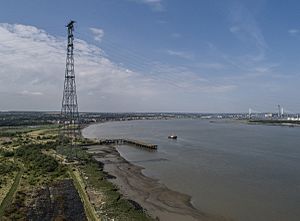400 kV Thames Crossing facts for kids
The 400 kV Thames Crossing is a huge overhead power line that stretches across the River Thames in England. It connects Botany Marshes in Swanscombe, Kent, to West Thurrock, Essex. The giant towers that hold up this power line are the tallest electricity pylons in the whole UK!
This amazing crossing was built in 1965. It has two massive towers, each standing 190 metres (623 feet) tall. That's taller than many famous buildings! Some people even think they were made just a little bit taller than the BT Tower in London. The distance between the two towers, called the span, is 1372 metres (4501 feet). The power lines themselves hang at least 76 metres (249 feet) above the river, making sure ships can pass safely underneath. Each tower has three special arms that hold two separate circuits of 400 kV (kilovolts) of AC electricity. This means a lot of power can travel across the river!
The Mighty Thames Crossing
This impressive power line helps move electricity from power stations to homes and businesses. It's a really important part of the UK's power network. The "400 kV" in its name tells you how much electricity it carries. "kV" stands for kilovolt, and 400 kilovolts is a very high voltage!
Building a Giant
Building such a huge power line across a wide river like the Thames was a big challenge. The towers needed to be incredibly strong and tall to support the heavy power cables over such a long distance. They are made from a strong metal framework called a lattice tower. This design makes them very stable and able to stand up to strong winds and bad weather.
How it Works
The power lines carry three-phase AC electricity. This is the type of electricity that powers most of our homes and devices. The electricity travels from power stations, through these big lines, and then gets sent to smaller power lines that go into towns and cities. It's like a superhighway for electricity!
Other Crossings
The 400 kV Thames Crossing isn't the only place where power lines cross the River Thames. Other important crossings include the Thames Cable Tunnel, the Dartford Cable Tunnel, and the London Power Tunnels. These are often underground tunnels where the power cables are laid, instead of overhead lines.
Images for kids
 | John T. Biggers |
 | Thomas Blackshear |
 | Mark Bradford |
 | Beverly Buchanan |







